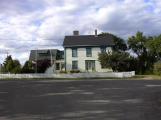1
William Henry Steeves3
William Henry Steeves was a great-grandson of Heinrich & Regina Stief, one of the first families to settle in Albert County. The Stief family immigrated first to Pennsylvania (USA) from Germany and then later moved to Albert County. William was the son of Joseph whose father Henry was one of the seven sons of Heinrich. William was born in 1814 in Hillsborough. The house in which he was born still stands today and is now a museum.4
The house where William Henry Steeves, one of the Fathers of Confederation, was born in 1814.15 September 2003
Hillsborough, New Brunswick, Canada

5
William was a very bright student. Even though the facilities for schooling and the quality of education available were poor by today's standards, there were several good teachers in the county school system. A good education from his teachers combined with his love of books helped make William a well educated man by the standards of the day.William married Mary Steeves at a very young age and opened a store on Main Street in Hillsborough. That same building now houses a store called Hillsborough Fashions. William was known as a very stern businessman, customers were not allowed to purchase on credit but had to pay in full up front. Thanks to his shrewd business sense, the business soon grew and William began to purchase woodlands and started shipping lumber to market aboard his own ships. Since lumber was in great demand in England and other markets during this time, William soon became one of the richest men in Albert County. As a prominent businessman and influential member of the community William made a good candidate for local politics. In 1846 he was elected to the House of Assembly in Fredericton as the Representative for Albert County, a position he held until his appointment to the second chamber of government, the Legislative Council, in 1851. During William's long political career he held many positions such as Member of the Executive Council of New Brunswick, Surveyor General, and Commissioner of Public Works. Around 1860 he moved to Saint John where he and his brother started a shipping business called "Steeves Brothers".
In 1862 he was a member of the delegation which went to Quebec to negotiate the contract for the building of the Intercolonial Railway. William was also one of seven delegates chosen to be part of the Charlottetown Union Conference, where union of the Maritime Provinces was discussed. He was then appointed as one of the delegates to the Quebec Conference later that same year where the union of Ontario, Quebec, New Brunswick, and Nova Scotia into the country of Canada was negotiated. New Brunswickers initially rejected union with Upper Canada. During the election of 1865, many of the politicians who supported Confederation were defeated. During this period William and the Hon. A.R. McClelan traveled throughout Albert County speaking in favour of Confederation. A year later, A.R. McClelan and the Liberal Party were elected on a pro-confederation platform. In 1867 William was called to the Senate in Ottawa. He was a member of the Senate until his death at his home in Saint John on December 9th, 1873.
